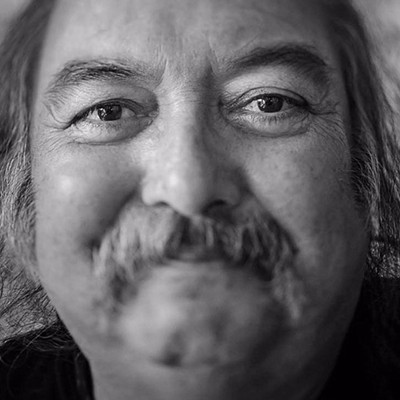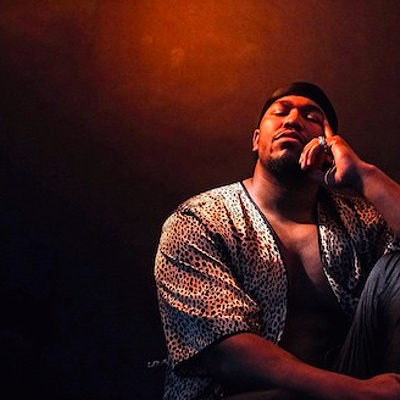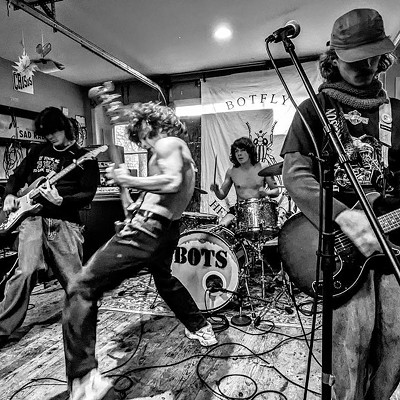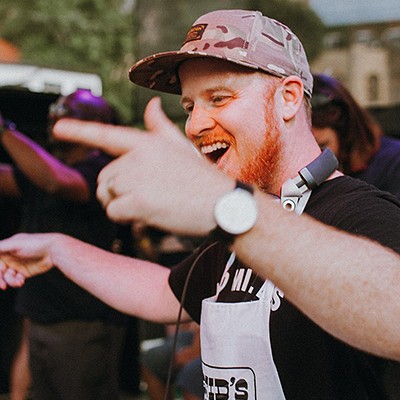Newfoundland native Cathy Jones moved to Halifax in 1993 to star in the CBC political satire This Hour Has 22 Minutes with Mary Walsh, Rick Mercer and Greg Thomey. A founder of the seminal troupe CODCO, she is the current 22 Minutes’ only original cast member. Evany Rosen moved from Toronto to attend King's College in 2005, where she was recruited by Mark Little and Kyle Dooley for their improv group Pumpkinface, now the eight-person sketch juggernaut Picnicface. They spoke over carbonated drinks at the Victory Arms Pub on a sunny Friday afternoon.
Did you move here in '93?
Jones: I moved here in '93, 22 Minutes started. My daughter went to the Shambhala School---she's 26 now, but she went to the first year of the Shambhala School. I came to do the TV show. We'd been doing CODCO here since '86 but we weren't living here. And then Mary decided to do 22 Minutes which is not something I'd do---political satire? I never watched the news, I still haven't watched the news. I'm starting to.
What was the television climate at that time?
Jones: I never know what they're thinking. Air Farce was getting on the go, people kept confusing us with them which was kind of painful. You know, we didn't know how to do TV when we started CODCO. We constantly put together shows with sketches---like, there would be a 17-minute sketch and then there'd be a one-minute sketch, and we didn't know how to put together a 22-minute package. When we started This Hour we said, "No sketches over two minutes." So the Two-Minute Rule was imposed right away. And at that point we didn't have the Harper government so people could actually get to the politicians. I never wanted to do that because that's not the kind of person I am, I find it rude. And you have to be really ballsy and not care what people think about you. But that was great, it was really fresh.
I didn't foresee it being able to survive and change the way it has with different types of things happening, but my opinion about the CBC is the feng shui of the building is causing the corporation to commit suicide. And to be in a position now that those guys are---you have to have balls of steel. Luckily a lot of the boys do. I think it's hard because the whole situation in the world is a lot of unenlightened leadership, people that don't really get that culture and native people and the earth and women are the most important thing. We've got this spoiled white-man culture that doesn't get anything.
In the States they have a much better chance at making shows. Maybe those guys'll go to the States. That would be really good. You'd get some actual money.
Rosen: That would be fantastic. Actual money is better than no money.
Jones: Canadian Tire money.
Rosen: Thank you, internet. Canadian Tire money, pretty much.
How did you end up in sketch in the first place?
Jones: We went to Toronto in '73 and we were pretending we had resumes. We didn't have a lot of experience. But we had one of those things where people come together at the same time---Andy Jones, Greg Malone, Tommy Sexton, Mary Walsh, me---were all there looking, Mary was going to Ryerson at the time, and everybody told us Newfie jokes. And it was 1973, and we just said 'Fuck this, we're never gonna find our place in Toronto theatre productions.' So we asked for 500 bucks from this company, Theatre Passe Muraille, and we made a show, a funny show pretending that we were really stupid Newfies. And we're gonna sell 'em this table that used to belong to our great-grandfather.
We came back to Newfoundland and we were like heroes, because we'd finally broken this thing of theatre from Newfoundland being about, you know, making fun of people who thought we were stupid. And so it was a revolution in theatre---and Ray Guy called us "the children of Johnny Burke." Before that all the theatre in Newfoundland was English drawing-room farce, stuff like that, and the people in the theatre were British people who had landed there, and then all of a sudden Newfoundland was really popular and had its cultural revolution. It was kind of a neat time.
We didn't do the television show until '86 but we broke up in between and did those things that theatre people did like be really hungry and not have jobs. And Mary did a couple of shows. Comedy and music, the great variety show, right? Now that I see the end of a TV show, I'm trying to get back to where those guys are. I'm like 'What are you doing? What are you doing?' 'Oh, I'm just shooting some stuff.' I'm in this world where if I hire somebody to shoot something, they're like, 'It's 40,000 a day, Cathy Jones.' You know what I mean? I'm not in that world. Andy Bush goes, 'You must know some people.' Who the fuck do you think I know? I don't know anybody! I know the guy who works at CBC, that's where I've fucking been. I don't even know the actors in this town. But I'm fixin' to.
Evany, you trained at Second City, right?
Rosen: I started improv when I was 14. And there's nothing worse than 14-year-old improv. It was a good way to start. I learned all the basics at Second City, which is cool because it means you can do weirder improv later. It was really cool for me, because the Second City rules for improv, I find, they are very by the book and there's a very specific school there. And it was great to have that background, the first stuff you know. And then I came out here and I met Mark and Kyle, and the whole Vancouver improv scene is so different, it totally blew my mind. I feel like I hit my stride more when I came out here.
Jones: Why was the Vancouver improv scene so different from the Toronto scene?
Rosen: It's less gamey, more absurd. And the long-form---long-form in Toronto is 'you do a monologue, you do a monologue, we do a scene. But this is 'keep saying a word over and over again until something comes out of it.' It sort of mirrors our sketch style. You do stuff by the rules so you can start doing stuff not by the rules.
Jones: I didn't go to university...even today my daughter was asking me, 'In two square kilometres, what would be the population in 1940 and did they have sidewalk chalk?' And I'm like 'I don't know what the fucking population would be in two square kilometres in 1940 in Poughkeepsie. Why don't you call someone smart?' And what I mean by that is Andy or Greg, I let them lead a lot. Not just cause they were guys---Mary was ballsy too---but that's always been my style. I don't know what it's like for you, do you feel the boy thing?
Rosen: Sometimes. In this context, where I'm at in my life with these particular men, I do get that but I don't think it's them in particular. We have different working styles and sometimes it gels and sometimes it doesn't but they're pretty good about that kind of stuff. Sometimes the male stuff sort of comes out. But they're not of that school where women aren't funny. But you encounter that with audiences all the time. You have to work twice as hard because they assume you're not funny. And you've gotta to prove to them that you are because they don't give you the benefit of the doubt.
Jones: You don't wanna go over-the-top to being one of those stand-up comedian girls...
Rosen: My vagina, my vagina, my vagina, periods!
Jones: It took me a lot of time to figure out how to do stand-up, and I don't know if I could do it right. but I'm just talking to you, I'm just telling you this thing. I'm not going to tell you this in a hyped-up way, I'm telling you this the way I would tell my friend. A character---that's different.
Rosen: Do you prefer doing characters?
Jones: They squeezed me into only doing a character at the comedy festival this year and I had the backwards arrowheads of rage going through my body, because I felt like it's become an international comedy fest---when I really liked it was when they had these fuckin' hilarious girls from PEI, I don't know who they were---they were called Drill something? Drill Queens! They were really funny. Now they've got the winner of Last Comic Standing. It's funny, but it's like , 'Oh great, now we're a world-class festival. I guess I'll just do my five minutes and get outta here.'
Did you find live audiences more receptive after you were on TV?
Jones: Yeah. When I tried to do stand-up in Montreal in fuckin' 1994, I was doing a character, you know: 'My youngest, I put her in the Parisian immersion cause they say it's a little bit better than the regular French.' Fucking saying that in Montreal? Woah. I didn't know the timing of jokes. Television's like an ad for yourself all the time. But because of my insanity and way of pushing myself down, this year I've convinced people to pay me 1/5th of what they used to pay me. I got $13 the other day from Just for Laughs from that piece that's on endlessly from when I was pregnant.
That's why if those guys get in the States, and they can make some actual money...here it's funny but you're bought out, you'll never get a residual. In the States you always get residuals.
Rosen: And back end.
Were you trying to get on TV between '73 and '86?
Jones: I was a hippie. I went back to the land in Nova Scotia in '77, I had dreadlocks before any girls had dreadlocks. Tommy and them got a TV show in '81, they had us on there in '83 doing the Friday Night Girls, and I did stage stuff. I wasn't trying to get on TV. Luckily. I think if I was trying to get on TV I would've been very discouraged. It's never been my style to push through when someone's being tough with me, so I never would've gotten on TV. Seriously, I've only ever gotten on TV, I think, because I'm good and people know I'm gonna be good and then if I had to have gotten it on the go myself it never would've happened. People have always sort of picked me up and brought me with them, you know? I've been lucky. I don't have that quality. I've got a film script---people say, well do you have a producer? It's like . What?
The Picnicface approach is opposite---you guys are actively pursuing television.
Rosen: We are actively pursuing it because we want something to happen, but as Cathy said---you sort of have this ad for yourself, you have whatever celebrity to use to your advantage. We have Andy's DVX and a dream, but we don't have anything, really. So we're starting to get some notoriety on the internet, but if we want to get anywhere we've gotta push it ourselves. Like you did with Theatre Passe Muraille and getting the money and doing it. We're at that stage in our careers.
The active approach is out of necessity. There's a give and take---our agents and our managers found us. We partially got our manager through Albert Howell, who's a writer on 22 Minutes, but our agents found us through Powerthirst. But in order to get them to do anything for us, we have to do things for them. We've got a lot of irons in the fire.
Jones: It's going to be such a different path for them.
Rosen: The internet changes everything.
Jones: That's right. The first they did was put these funny things on the internet, and then they get a hit from, what's his name?
Rosen: Will Ferrell.
Jones: They get a lot of hits from these things, that's a good way to go. That's a good way to find people too. If you're out there, people know about you and they get you for something. You just don't know. It's an ad for yourself too, but you made it yourself.
Rosen: A sort of less-viewed, more poorly funded ad. It's a way to be proactive that wasn't possible until this new frontier of the internet came about. Because you can put something out and know that it will get viewed in some capacity and wait for things to come to you in a way that you couldn't in that medium before.
Cathy, do you think Picnicface have more opportunity than you did? CBC certainly was a different place 15 years ago.
Jones: CBC has been really supportive of us. I don't think I've pissed them off too much lately, I think I've been a good girl. There are things that I'd like to be able to do, but it's too stressful.
It's karmic in a way. I saw Kathleen Phillips and I didn't even know about her, and now I think 'If I could get her and put her together with these other funny people...' I'm thinking along the lines now of, I want to have a comedy festival, I want to bring theatre together. I want this town to be teeming with fun stuff. Newfoundland is very powerful in terms of community theatre. The other day I went home to see *Five Short Plays in a Bathtub*, Lois Brown, and it was the funniest fucking thing I've ever seen. I'm inspired by theatre now. The good thing about not having any money is that people will do stuff for you for free. You're still in the scene. If you have money you think, 'Well, I guess I can do a show and maybe lose $10,000 this summer and it'll be ok.'
I want to do a show called The Complete First Season and do the whole thing I would've done on TV if I'd had the balls to actually push through and be a tough cookie, just do it on stage. Have a cast of thousands. If I go to a beauty parlour in it, I want six people that just appear in the beauty parlour scene. I could have a cast of 35, 40 people and do a show. And nobody gets paid more than $17.
Any tales from the trenches?
Rosen: I did one stand-up show in PEI, I'm this little Jewish girl up there telling jokes, and it was like silence like you've never heard before. And just the idea that a woman, and a Jew---which I'm sure they had never seen before---was there to entertain them and that they had paid legal tender for this service was just like, what?
Jones: Oh Jesus Christ.
Rosen: So even though all the male comics I'm out there with think it's great and have no qualms that I can be as funny as them, there's still a whole roomful of, like, 45-year-old lobster fisherman who are like 'Fuck you.' Which is a terrible stereotype of PEI, but that's what it felt like.
Jones: I've done conferences with all men. All IT professionals, internet technology geeks. And like holy fuck, I just sweat bullets. Sometimes I've done this thing where I've just gone: 'Fuck it. Fuck you. You know? You're staring at me? I'll just stare at you.' And then I realize that's crazy, that's insane, I need help. But it's really awful.
Rosen: And that's where the stereotypes come in.
Jones: It's sexism! Women get the strong message that, first of all, they need to be a certain thing. And men---it's like that song, 'Everybody's a little bit racist'? People are still sexist! Right? They're still a little bit sexist. Since they're sexist, it's not just when you're performing, it's all the way along---women are made fun, pushed into a certain role, it's painful.
Even though I'm funny I don't like getting old. And you can be an old comedian if you want, Phyllis Diller looks better now. It's hard to tell the truth about what happens to you when you're a woman. 'Oh, you know, ha ha, I fuckin' had to have another abortion. Ha ha!' There's a lot of painful shit. Being funny---I think there's a lot of funny women in arts and comedy. It's just like life---the boys rush in and push you out of the way. They're like bullies. Big, ballsy bullies. They're not *not* nice people, but it's a different level of confidence. If I write a book and the book is good and I have to write a second book, I'll never write the second book. Whereas my boyfriend's just like write the second book, write the third book...I can't be sensitive, I guess, and a lot of women are quite sensitive. It's hard.
If I do a show for all women...I've done a show for like an hour-and-a-half, because I keep thinking of stuff they're gonna find funny. Put some men in there, like with their husbands out on a date, and they get less hilarious as an audience. And you get all men and it can be another fuckin kettle of fish. Actually I had to be held back from attacking a woman in the front row during CODCO. There's a woman looking and we're doing the funniest shit and I'm like and they had to hold me back and I spit at her as I was leaving the stage. Pretty dramatic.
Evany, anything like that?
Rosen: No, just like: please laugh. Please. It's also a question of if you're gonna be a woman and you're gonna be funny, are you gonna be funny to men? Are you gonna be funny to just women? Or are you gonna try and find a way to be universally funny? That's a question you have to ask yourself as a female comedian. Like it or not, male comics don't sit around all, 'Am I gonna be funny for the men?' They're funny or they're not and then it's over.
But with women you have to be delicate: if you're too pretty they don't like you, if you're too gross they don't like you, if you're not gross enough they don't like you. And there's these stereotypes that you're either scary and mean and your vagina is barbed and you're out to kill or you're like, 'I love dick.' Those are the only options as a female comic is what it feels like sometimes. And you're expected to only talk about that. I find when I do stand-up they're expecting me only to talk about being a woman. And sometimes things are funny, and they have nothing to do with anything.
Jones: That's where characters come in handy. It doesn't matter what sex they are, they're just these strange people. If you have a bunch of material that works for women but doesn't work for a roomful of men, that's means you've gotta work hard to fuckin' write more material. Say you get a gig and it is gonna be 89 percent men, you're gonna have to stand up there as a woman and say 'Alright, we're on equal footing here.'
If they don't laugh---I don't know about you, but I've always panicked when people don't laugh. And then I get faster. My brother always says, 'When they don't laugh, slow down. Don't get fast.' Usually it's like . You don't care what you said. It's just, 'You're not laughing, I'll just kill myself right now.'
Do you find sketch easier because you've got an extra layer between you and the audience?
Rosen: Um, sometimes. It depends on the sketch, to be honest. I like doing character monologues because we're having this one-on-one experience. Sometimes when you're the only girl in a sketch it's like, 'Oh I won't laugh at your lines, I'll just wait for one of the boys to come back so I can laugh at the appropriate moment again.' Well, if I'm the only one up here, then fuck you. Which is not really how I feel. I don't actually have too much rage most of the time. And I love doing shows at Ginger's, because our audiences there are wonderfully loving and awesome.
Jones: She means drunk. I'm just kidding.
Rosen: But it entirely depends on the sketch. And improv it depends on who you're doing it with. Because then there's the issue of, like what Cathy said, of the boys getting aggressive which sometimes they can---I don't mean necessarily my boys, but boys in general can be. And improv too, you can just get bulldozed.
Jones: You don't have to be a girl to get bulldozed.
Rosen: At the same time, there is that way to just envelop yourself in the character and the scene that you're doing. And also, it's sort of weird for me because a lot of the stand-up experiences I've had---and I'm just getting started, you know our sketch audiences are mostly at Ginger's so that is not comparable to those dudes in PEI; if I did stand-up at Ginger's I would probably get the same reaction as when I do sketch at Ginger's---it's audience more than anything.
Jones: Years ago I used to write stuff for the TV show and I got a nervous breakdown about writing and now I don't write anymore. They are writing and writing and we get more writers every year and this year we topped out at 16 writers on the show And they brought in some really great women writers.
I'm also an environmentalist and I want to talk about that, and when I start writing comedy I get really serious and over-the-top and it's going to take a long time to process out the jokes from the stuff that I really want to say---you know they've got these nice new box stores on the way in from the airport, where there used to be just blueberries and trees? In the TV show, I *still* struggle---you guys, I know you wanna play, I know you wanna do your thing, you're up for it, you're into it and it's like go-go-GO! But I still feel like I don't want to push because I want to be liked. And that's my own personal neurosis. And I don't wanna bring in material that's too personal, too sensitive, not edgy enough. So I have really backed off the writing.
But those really strong women they brought in, and our head writer is a woman this year and it's like, that really gives you... oh, you know?
---Tara Thorne












